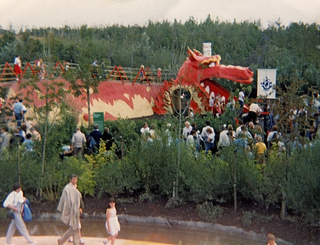 W
WThe 1984 Eccles rail crash occurred on 4 December 1984 at Eccles, Greater Manchester, when an express passenger train collided at speed with the rear of a freight train of oil tankers. The driver of the express and two passengers were killed, and 68 people were injured. The cause of the accident was determined to be that the driver of the express train had passed a signal at danger.
 W
WThe Abbeystead disaster occurred on the evening of 23 May 1984 when a methane gas explosion destroyed a waterworks' valve house at Abbeystead, Lancashire, England. A group of 44 visitors were inside the underground building at the time attending a public presentation by North West Water Authority (NWWA) to demonstrate the operations of the station. Eight were killed instantly by the explosion, and the others were severely injured. The explosion also caused the concrete roof to fall down on to the group, destroying the steel mesh floor and throwing some of the victims into the water chambers below which rapidly filled with river water. Another eight people subsequently died of their injuries in hospital. An 11-year-old boy and his mother were among the dead. The official inquiry into the disaster concluded that the methane had seeped from coal deposits 3,937 feet below ground and had built up in an empty pipeline. The gas was then ejected into the valve house by the sudden pressure of water as the pumps were switched on. The cause of ignition has never been determined.
 W
WPC Brian John Bishop was a British police officer who was shot in the head by an armed robber in Frinton-on-Sea, Essex, on 22 August 1984. He died from his injuries five days later in a London hospital.
 W
WThe Brighton hotel bombing was a Provisional Irish Republican Army (IRA) assassination attempt against the top tier of the British government that occurred on 12 October 1984 at the Grand Brighton Hotel in Brighton, England. A long-delay time bomb was planted in the hotel by IRA member Patrick Magee, with the purpose of killing Prime Minister Margaret Thatcher and her cabinet, who were staying at the hotel for the Conservative Party conference. Although Thatcher narrowly escaped the blast, five people connected with the Conservative Party were killed, including a sitting Conservative MP, and 31 were injured.
 W
WThe Chesterfield by-election, 1984 was held on 1 March 1984 for a seat in the House of Commons of the United Kingdom to represent Chesterfield in Derbyshire. This followed the resignation of the sitting Labour Member of Parliament (MP) Eric Varley.
 W
WCouncil of Civil Service Unions v Minister for the Civil Service [1984] UKHL 9, or the GCHQ case, is a United Kingdom constitutional law and UK labour law case that held the royal prerogative was subject to judicial review.
 W
WThe International Garden Festival was a garden festival recognised by the International Association of Horticultural producers (AIPH) and the Bureau International des Expositions (BIE), which was held in Liverpool, England from 2 May to 14 October 1984. It was the first such event held in Britain, and became the model for several others held during the 1980s and early 1990s. The aim was to revitalise tourism and the city of Liverpool which had suffered cutbacks, and the idea came from Conservative Environment Minister Michael Heseltine. The festival was hugely popular, attracting 3,380,000 visitors.
 W
WThe Battle of Orgreave was a violent confrontation on 18 June 1984 between pickets and officers of the South Yorkshire Police (SYP) and other police forces at a British Steel Corporation (BSC) coking plant at Orgreave, in Rotherham, South Yorkshire, England. It was a pivotal event in the 1984–85 UK miners' strike, and one of the most violent clashes in British industrial history. Journalist Alastair Stewart has characterised it as "a defining and ghastly moment" that "changed, forever, the conduct of industrial relations and how this country functions as an economy and as a democracy". Historian Tristram Hunt has described the confrontation as "almost medieval in its choreography ... at various stages a siege, a battle, a chase, a rout and, finally, a brutal example of legalised state violence". Most media reports at the time depicted it as "an act of self-defence by police who had come under attack", and there still exists a body of opinion that the police at Orgreave "were upholding the law in the face of intimidation from thousands of strikers".
 W
WOn 20 December 1984 a dangerous goods train passing through the Summit Tunnel on the Greater Manchester/West Yorkshire border, caught fire on the rail line between Littleborough and Todmorden, England.
 W
WMark Anthony Tildesley was an English schoolboy who disappeared, at the age of seven, on 1 June 1984, whilst visiting a fair in his home town of Wokingham in Berkshire.
 W
WThe Wembley Central rail crash was a fatal railway accident that occurred on 11 October 1984 just outside Wembley Central railway station, Greater London.